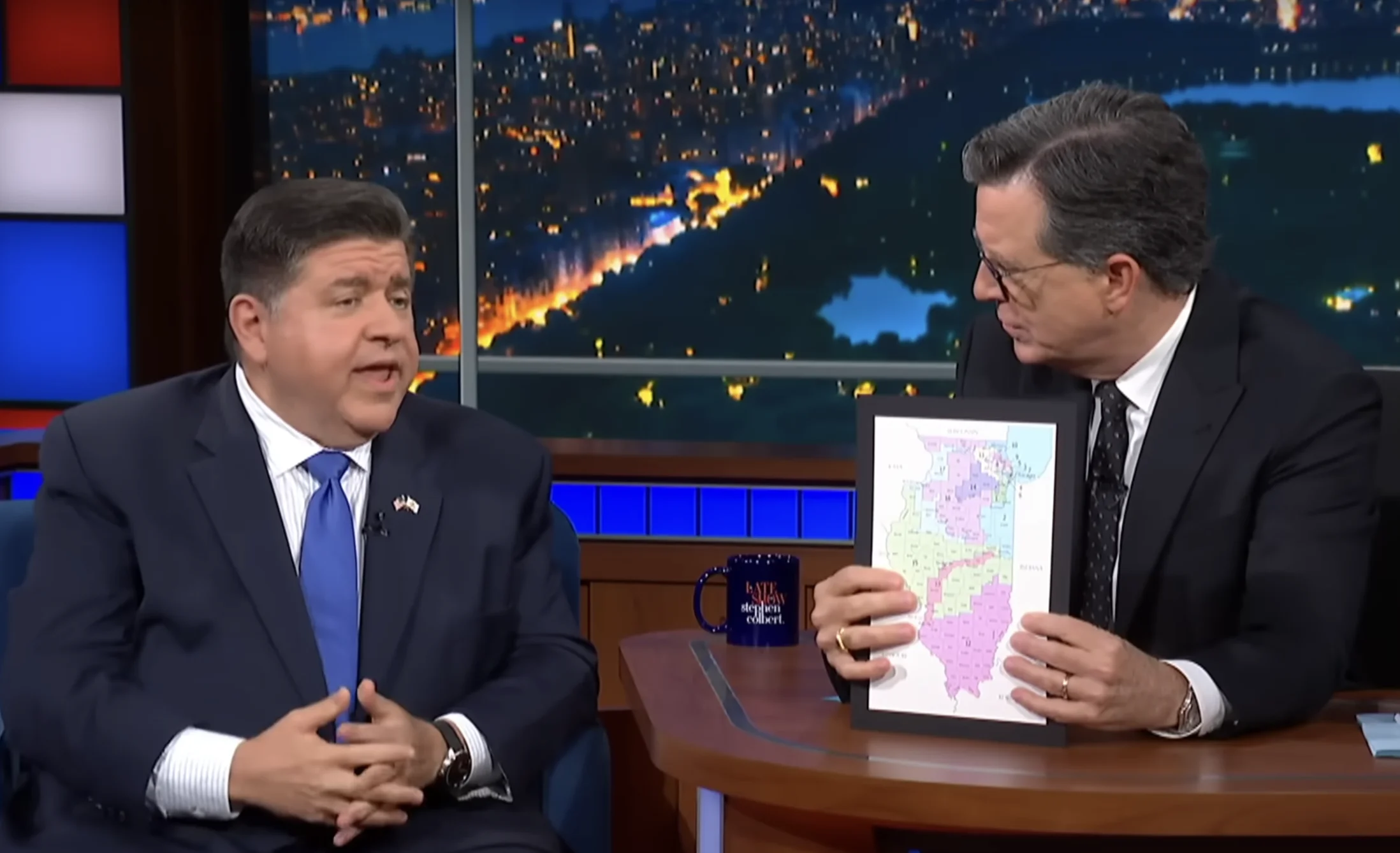Illinois Gov. J.B. Pritzker appears on The Late Show with Stephen Colbert as a map of Illinois' heavily gerrymandered congressional districts is displayed, drawing attention to the state's controversial redistricting practices. | YouTube / The Late Show with Stephen Colbert
Illinois Gov. J.B. Pritzker appears on The Late Show with Stephen Colbert as a map of Illinois' heavily gerrymandered congressional districts is displayed, drawing attention to the state's controversial redistricting practices. | YouTube / The Late Show with Stephen Colbert
Brad Halbrook, state representative from Shelbyville, said Illinois Gov. J.B. Pritzker’s support for Texas Democrats fleeing their legislature to block GOP redistricting highlights political hypocrisy and problems in Illinois’ democratic processes.
For two weeks, Texas Democrats stayed in Illinois to protest a proposed mid-decade congressional map in Texas that would shift up to five seats from Democrats to Republicans.
Pritzker described the Texas Democrats’ actions as a principled stand against gerrymandering and accused Texas Republicans of “stealing seats.”
Halbrook said the reaction is “purely theatrical.”
“Gerrymandering has been a longstanding element of the political landscape. The maps drawn by Democrats in Illinois are some of the most egregious examples of gerrymandering ever created, both at the congressional and state levels,” Halbrook told the Chambana Sun.
Illinois Democrats hold 14 of 17 congressional seats, despite 44% of Illinois voters backing Donald Trump in 2024. Democrats also hold supermajorities in the General Assembly: 67% of the House and 68% of the Senate.
National watchdogs have ranked Illinois among the worst offenders for partisan redistricting. The Princeton Gerrymandering Project gave the state’s congressional map an “F” for fairness.
“Many voters feel disenfranchised and frustrated,” Halbrook said. “They are weary of Chicago Democrats imposing their radical views on the entire state. The desire for a voice in the political process is something I hear about everywhere I go. There is a growing number of people who are tired of the one-party rule in Illinois.”
Pritzker called discussion of Illinois maps a “distraction” during an interview with NBC’s Kristen Welker.
On The Late Show with Stephen Colbert, Pritzker was shown Illinois’ gerrymandered congressional district map, with Colbert highlighting its unusual shapes.
“We handed it over to a kindergarten class and let them decide,” Pritzker said.
Halbrook said Pritzker’s support for Texas Democrats contrasts with his prior campaigning on fair maps.
“While Pritzker may have genuinely intended to support reform, his actions reveal that his true allegiance lies with party leaders rather than the voters,” Halbrook said. “The public is calling for reform, but the Democratic Party is committed to obstructing any real efforts for change regarding redistricting.”
Halbrook and other Republicans say the imbalance extends beyond voting maps. In recent legislative sessions, Republicans have been stripped of the right to debate pending legislation, and millions in grant funding have been directed primarily to Democratic districts, despite taxpayers from all areas contributing.
“The budget process is fundamentally flawed. Democrats systematically exclude Republicans from meaningful participation,” Halbrook said. “Republican districts often receive little to no funding for projects. Since everyone contributes taxes, funding allocation should be fair, irrespective of political affiliation. It is time to bring some real transparency and accountability to [the] budgeting process.”
Illinois’ gerrymandering issues date back decades.
Former House Speaker Michael Madigan, who is set to begin a 7.5-year prison sentence for public corruption in October, was known for drawing maps that protected Democratic incumbents and reduced competitive elections.
In 2016, a Madigan-aligned Illinois Supreme Court justice blocked a voter-led referendum to create an independent redistricting commission, citing a narrow technicality.
Meanwhile, Texas is preparing to pass its revised congressional map—the one Illinois Democrats unsuccessfully tried to block. In California, Democrats are pursuing a mid-decade redistricting that could shift five seats away from Republicans.
Halbrook said both parties manipulate redistricting but lack consistency.
“Both parties lack consistency on the remapping issue,” he said. “Historically, political parties have controlled the map-drawing process to secure advantages for themselves. If anyone is genuinely concerned about the partisan nature of district maps, they should actively participate in advocating for genuine reforms that remove politics from the process.”
Fair maps proposals in Illinois have gained traction but have repeatedly been blocked from ballot consideration.
“An independent redistricting process would create more competitive electoral districts,” Halbrook said. “Voters would be more able to engage in genuine discussions about the issues. Currently, many districts are so heavily partisan that actual races seldom occur. Transitioning to an independent map process would make government more accountable to the people.”
In late August, two former Obama administration Cabinet members, Bill Daley and Ray LaHood, launched “Fair Maps Illinois,” a bipartisan effort to create an independent redistricting commission through a 2026 constitutional amendment.
The proposed commission would ban the use of political or voting history in mapmaking and focus on compactness and community integrity, though it would not apply to congressional maps due to constitutional limits.
Supporters will need over 320,000 valid signatures to place the amendment on the ballot and hope it gains momentum during the 2026 election cycle.
“The movement to place the FAIR Map Amendment on the ballot must keep going and we must put pressure on the Democrats for continuing to block it from getting on the ballot,” Halbrook said.


 Alerts Sign-up
Alerts Sign-up